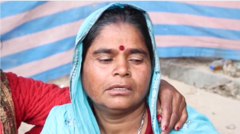Tessa Moura Lacerda reflects on the painful legacy of her father’s torture and death during Brazil’s military dictatorship, revealing the ongoing quest for justice and recognition of victims as society grapples with its past.
A Daughter's Quest for Truth: The Fight for Recognition and Closure

A Daughter's Quest for Truth: The Fight for Recognition and Closure
Tessa Moura Lacerda's journey reveals the enduring impact of Brazil's military dictatorship as she seeks justice for her father's violent death and the broader acknowledgment of victims' suffering.
In a poignant moment of relief, Tessa Moura Lacerda stood with her mother outside a government office on a rainy August morning in 2019, clutching a long-sought document—the corrected death certificate of her father, who died under torture at the tender age of 24 during Brazil's harsh military regime. This certificate, stating an "unnatural, violent death caused by the State to a missing person [...] in the dictatorial regime established in 1964," served as a bittersweet milestone in the almost 46-year fight for her family's acknowledgement and closure.
Tessa's father, Gildo Macedo Lacerda, was arrested in 1973 along with Tessa’s mother, Mariluce, as part of their involvement in a left-wing movement advocating for democracy against the military regime that targeted dissenters. Following their arrest, Gildo disappeared for six days and was believed to have perished in a military facility. His death, however, was veiled in false narratives, with government reports alleging he was killed in a street altercation, part of a broader campaign to distort the truth surrounding political repression.
The family only learned of Gildo's fate through testimonies during a truth commission years later, which chronicled the terror inflicted upon activists, but Tessa has been haunted by the absence of her father’s remains. Growing up, she struggled with a deep sense of loss and trauma that followed her throughout her life, compounded by the fact that, until recently, her father was not officially recognized on her birth certificate. The battle for justice went beyond personal loss, becoming a commitment to advocate for all victims of systemic oppression.
Tessa saw the official correction of her father's death certificate as a significant achievement, highlighting the ongoing struggle for recognition of those impacted during the dictatorship. In December, Brazil announced the rectification of all recognized victims' death certificates; however, many families, including Tessa's, faced challenges under prior administrations that obstructed progress. A Supreme Court representative described the amendments as a crucial step towards reconciling with Brazil’s painful history.
The release of the film "I'm Still Here" has reignited discussions around the violent chapters of Brazilian history, capturing narratives that resonate with many families still grappling with unresolved grief. As recent political tensions surface, including efforts to suppress historical truths, the need for collective acknowledgment becomes ever more critical.
As Tessa and other families fight for their loved ones' recognition while battling societal amnesia, they recognize this struggle as both personal and collective. The journey towards justice includes working to dismantle the amnesty law that currently protects those responsible for the atrocities committed and to ensure that the historical wounds do not lead to further cycles of pain.
Tessa firmly states, "I will not stop fighting until the end of my days," emphasizing her determination not only to find closure for her family but also to honor the memories of all those affected by the dictatorship's brutality. In her words, "We must work to clear up this history, to acknowledge our pain."






















